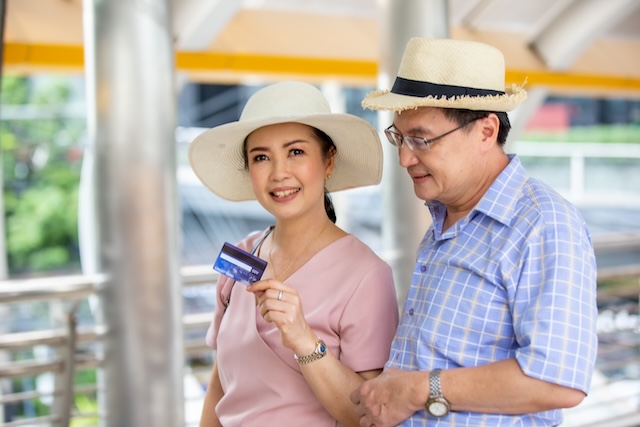Being aware of the common Thailand scams is essential for any traveler. While the country is magnificent and welcoming, a dream trip can quickly turn into a nightmare due to a few well-oiled traps. Knowing these schemes is the best way to protect yourself.
This comprehensive guide focuses specifically on the scams to be aware of in 2026.
🚨 Top 3 Scams to Know in 2026
- “Closed” Temples and Tuk-Tuk Detours: Mainly in Bangkok, drivers redirect you to partner shops.
- “Damaged” Scooter/Jet Ski Rentals: Common in Phuket and Pattaya, where you’re charged for pre-existing damage.
- Digital Fraud (TDAC, QR Codes): Fake websites and fraudulent QR codes across the country aim to steal your data or money.
“Closed” Temples and Tuk-Tuk Detours

It’s a classic: near a temple, a tuk-tuk driver approaches you claiming the site is closed for a ceremony. He then offers a cheap “special tour” that actually takes you to jewelry stores or partner shops.
How to Avoid the Tuk-Tuk Scam:
- Check for yourself if the temple is actually closed.
- Politely but firmly refuse. In a culture that values harmony, how you refuse is essential. Our guide on etiquette in Thailand is a valuable ally for declining an offer without creating tension.
“Factory Price” Gem Shops and Tailors
The scenario is simple: a tout recommends an “official” gemstone shop or a “government” tailor with supposedly unbeatable prices. The risk is leaving with a poorly fitted suit or a worthless piece of jewelry.
How to Protect Yourself from Fake Deals:
- Never buy under pressure.
- Be wary of “great deals” from drivers or strangers.
Fake Police and Bogus Checks
Individuals in uniform stop you in the street or in a taxi, ask to see your passport, and then demand an immediate cash “fine.” The most common trap in 2026 involves e-cigarettes: scammers (or corrupt officers) catch you vaping and demand 20,000–30,000 THB on the spot to avoid “jail.”
⚠️ Crucial Warning: Vaping is strictly illegal. To avoid being an easy target, read our full guide on Thailand vaping ban 2026.
What to Do with Fake Police:
- Ask to see their badge and refuse to pay on the spot.
- Call the tourist police: 📞 1155
Rental Scams: Scooter, Jet Ski, and Taxi
Particularly common, transportation scams are among the most frequent complaints. The typical case: you rent a scooter or jet ski, and upon return, the owner accuses you of damaging it to demand an exorbitant amount. Another situation: a taxi driver refuses to turn on his meter to charge you a sky-high flat rate.
Tips to Avoid Rental Scams:
- Film the vehicle (scooter or jet ski) from all angles before leaving.
- Never leave your passport as a deposit. Offer a photocopy and a cash deposit instead.
- Choose rental agencies with good Google reviews.
- Always insist that the taxi driver use the meter or get out of the vehicle.
- Use reliable local apps like Grab or Bolt.
To learn more, check out our complete guide to renting a scooter in Thailand.
For real-life examples, watch these rental scams in action on our recommended Thailand YouTube channels.
Fake Petitions or Street Currency Exchange
You are approached to sign a petition, often under a humanitarian pretext (for the deaf/mute). This is a ruse to distract you and allow an accomplice to steal from you. The same technique is sometimes used for a simple currency exchange request.
How to React to Street Scams:
- Ignore these approaches, even if they seem friendly.
- Stay vigilant in crowded tourist areas.
Scams at Currency Exchange Booths

Beyond fake bills or calculation errors, more sophisticated scams are emerging. In October 2025, a network made headlines by stealing over a million baht with a distraction technique: the scammer pretends to have already made a foreign currency transfer and, through trickery, convinces the staff to hand over the baht before the transaction is actually confirmed. This is in addition to more common traps where some unscrupulous booths may give you fake bills or rig the calculation.
How to Avoid Exchange Scams:
- Use reliable booths like SuperRich, SCB, or Kasikorn.
- Check rates with an app like XE.
- Count the money in front of the cashier without getting distracted.
Imposters at Train Stations and Airports
Upon arrival, fake “agents” may aggressively direct you to overpriced taxi drivers or travel agencies.
Solution Against Touts:
- Systematically ignore touts who approach you at the exit.
- At airports (Suvarnabhumi BKK, Don Mueang DMK), follow the “Public Taxi” signs to use the official queue with a ticket. This is the only guaranteed scam-free method.
- In train stations, prefer official ticket counters or use apps like Grab/Bolt.
Scams in Bars or Clubs
The trap: abusive billing or exorbitantly priced drinks, sometimes at the insistence of hostesses. These practices can be akin to extortion.
Prevention in Bars:
- Choose venues with good ratings on Google or TripAdvisor.
- Ask to see the menu before ordering.
Romance Scams
This is one of the most painful scams, where criminals create fake online relationships to extort money under false pretenses (medical emergency, debt, etc.). These frauds can last for months and cause considerable financial and emotional damage.
Given the complexity of this topic, we have dedicated a complete guide to it, detailing the scammers’ techniques and how to effectively protect yourself.
➡️ Read our complete guide: How to Avoid Romance Scams in Thailand
Digital and Online Thailand Scams

Scams have largely moved online and can take more complex forms than simple card theft. Be vigilant about:
- Bank account freezes: for foreigners without long-stay visas.
- Bank card fraud: via “skimmers” on ATMs.
- Phishing: through fake emails or SMS.
- QR Code scams: fake codes stuck over real ones.
- Investment scams: via fake trading platforms.
- E-commerce fraud: through fake promotions (Lazada, Shopee).
The most recent and impactful threat is the bank account freeze. To combat fraud, Thai banks are massively blocking the accounts of foreigners deemed non-compliant. To understand the reasons and solutions, check out our guide on a blocked Bangkok Bank account. This phenomenon is not isolated to Thailand, as shown by the situation of expatriates with a blocked bank account in Vietnam.
Digital Security Tips:
- Use ATMs located inside banks.
- Cover the keypad with your hand when entering your PIN.
- Never click on suspicious links and always check the official URL of websites. Before scanning a QR Code, make sure it has not been tampered with.
- Consider using a virtual or prepaid card for your online purchases.
SIM Card or Delivery Scams
In tourist areas, street vendors may offer faulty or overpriced SIM cards. Also, beware of delivery scams, where a fake delivery person claims fees for a package you are not expecting.
What to do for SIM cards and deliveries:
- Buy your SIM card from official AIS, DTAC, or True shops.
- Be wary of unknown delivery people asking for money.
Thai Digital Arrival Card (TDAC) Scam
Mandatory since May 1, 2025, the digital arrival card (TDAC) must be filled out before entering Thailand. This form is free and should only be completed on the official website: tdac.immigration.go.th. ⚠️ Warning: many fraudulent sites offer to do it for a fee.
Tip for the TDAC card:
- Always check that the URL is the official website.
- Never pay any fees for the TDAC.
To learn all about the official procedure, check our article on the Thai Digital Arrival Card (TDAC).
Fake Hotel or Accommodation Bookings
Some fraudulent websites or social media ads offer very cheap accommodation. Upon arrival, the place doesn’t exist or is already rented.
How to Avoid Fake Bookings:
- Book through well-known platforms (Agoda, Booking, Airbnb…) with good reviews.
- Avoid direct bank transfers to unknown accounts.
Drug-Related Scams
The trap: you are offered drugs on the street and, if you accept, fake police officers appear to demand an immediate “fine” under threat of arrest.
Important Point on Drugs:
- Drug possession, even in small amounts, is severely punished by law. A particular point of vigilance concerns the laws on cannabis, which have become very strict again and are enforced with zero tolerance for tourists.
- Systematically refuse such offers to avoid serious legal trouble.
Job and Visa Scams: The “Scam Factories” Trap
Beware of ads for high-paying jobs (digital marketing, customer service) based near the borders with Myanmar or Cambodia. This is often a trap set by criminal networks to supply their “scam factories.” Tens of thousands of foreigners, attracted by false promises, are held captive there and forced to commit large-scale online scams. Victims report cases of torture and inhumane living conditions.
Faced with this scourge, which generates billions of dollars, Thai authorities massively strengthened border security in early 2025, in collaboration with China, to dismantle these networks. In the same spirit of combating fraud, a crackdown on improperly used visas was launched. So, be wary of “agents” who promise visas (student, volunteer) without real conditions, as Thai authorities massively revoked fraudulent visas in 2025, leaving many foreigners in an illegal situation.
Tips to Avoid These Traps:
- Be wary of job offers that seem too good to be true, especially if they are located in remote border areas.
- Never give your original identity documents to an unknown recruiter.
- Always check the background of the recruiting company.
- For visas, only go through reputable and officially registered schools, organizations, or lawyers.
Real Estate Scams in Thailand
The real estate sector, which attracts many foreign investors, is not free from scams. Dishonest companies may sell the same property multiple times, falsify title deeds, or market phantom construction projects.
Tips to Avoid Real Estate Traps:
- Never sign anything or pay money without the advice of an independent lawyer.
- Verify that the land or condo actually exists on Thai cadastral records.
- Beware of “exclusive offers for foreigners” without solid legal guarantees.
- Be aware that Thai law prohibits foreigners from owning land in their own name.
“Ping Pong Show” Scams
Widespread in tourist areas (Patpong, Patong, Walking Street), these shows are often tourist traps. Entry may seem free, but once inside, expect an exorbitant bill for drinks or unsolicited “fees.”
How to Avoid Ping Pong Show Scams:
- Avoid street touts who promise a “special” show.
- If you go, check that the price list is clear and official.
- Do not stay if you are prevented from seeing the prices in advance.
Fake Elephant Sanctuaries
Perhaps the cruelest scam is the one that plays on your good conscience. Many camps present themselves as ethical “sanctuaries” or “rescue centers,” when in reality, the elephants are mistreated, trained with violence, and exploited for tourism (rides, forced baths). These establishments ride the wave of responsible tourism to attract well-intentioned visitors.
How to Choose a Real Sanctuary:
- An ethical sanctuary never offers elephant rides.
- Interactions are limited: you observe the animals, you can feed them, but avoid forced “baths” or excessive contact.
- Look for centers certified by organizations like World Animal Protection. Places like Elephant Nature Park near Chiang Mai are benchmarks.
Never Leave Your Passport as a Deposit
Although some rental shops (scooters, jet skis) require it, leaving your passport as a deposit is a risky practice that can lead to blackmail. Moreover, your passport is an official government document that you should never entrust to a third party.
Recommended Alternative for a Deposit:
- Leave a photocopy or a reasonable cash deposit.
- Choose a rental shop that agrees to take a simple photo of your passport or a credit card imprint.
Actions by Authorities Against Scams
Rest assured, Thai authorities take these problems seriously. The tourist police conduct regular operations, particularly against illegal jet ski renters in Phuket, and are intensifying their fight against digital fraud. In general, their cooperation with tourists is good.
What to Do If You Are a Victim of a Scam?
If you are a victim of a scam, here is what to do:
Beyond emergency contacts, it is essential to know that you have rights. As announced by Anant Wongbenjarat, Director-General of the Department of Tourism, there is now an official recourse: “Foreign tourists who have been scammed in Thailand can now file a claim for compensation with the ministry if they were cheated by registered travel agencies that did not provide the advertised services.” This process, which goes through the Tourist Business Protection Fund, offers a real path to obtaining compensation, provided you always verify that your agency is registered with the Department of Tourism.
- 📞 Call the tourist police: 1155 (free number, 24/7, English service)
- 📍 Go to the nearest police station to file an official complaint.
- 📸 Keep all evidence: photos, videos, messages, receipts.
- 📩 Contact your embassy if the problem is serious or if you lose your documents.
- 💬 Report the scam on forums or traveler groups to help others.
Stay calm and present concrete evidence. Generally, the police are cooperative with tourists.
Conclusion: Staying Vigilant Against Scams in Thailand

Thailand is a safe and welcoming country, where a few precautions are enough to avoid bad surprises. Good preparation remains the best protection. By staying vigilant and well-informed about scams in Thailand, you will avoid most traps, including those targeting long-term travelers or investors. For a complete view of local news, feel free to also check our Thailand crime news feed. This guide will be regularly updated to track new fraudulent practices.
🔄 Last updated on January 16, 2026
